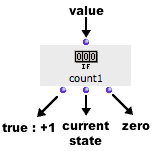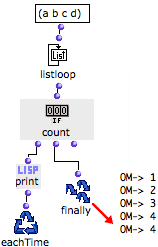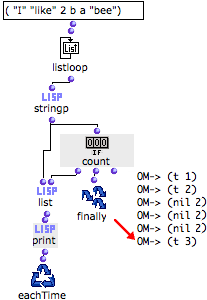Count : Counting Items
 Count
is a counter. Its internal value increases at each evaluation evaluated, if the input value is non nil.
Count
is a counter. Its internal value increases at each evaluation evaluated, if the input value is non nil.
Inputs and Outputs
|
Count has one default input and three outputs : - "what" : a value.
- first output : triggers the increment of the counter if the input is non nil, and returns its current value.
- second output : returns the current state of the counter.
- third output : resets the value of the counter to zero.
|
Examples
Counting the Items of a List
Listloop returns each element of the list successively to count. These elements are non nil values. The first output of count adds 1 every time listloop returns an element. Once the enumeration of listloop is over, the final state of count is returned by Finally.
| |
Counting Specific Items of a List
We will now apply count more specifically, to know how many
strings
a list contains among other types of items.
|
Listloop enumerates the elements of a list. The stringp predicate returns true every time it evaluates a string. At each step of the loop, the first output of count is evaluated : - if it gets a non nil value from stringp, it increments the value of the counter
- if it gets "nil", the value doesn't change.
The results returned by stringp and counter are gathered in a list and printed. The total number of strings, that is, the final state of counter is returned by Finally.
|
![]() Count
is a counter. Its internal value increases at each evaluation evaluated, if the input value is non nil.
Count
is a counter. Its internal value increases at each evaluation evaluated, if the input value is non nil.


